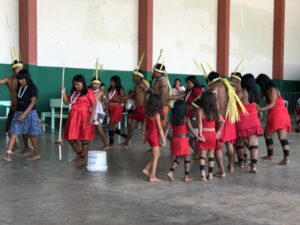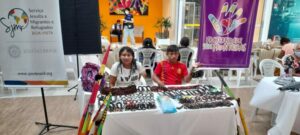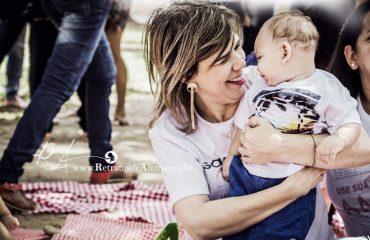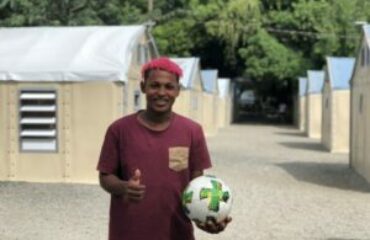The Boa Vista Junina (Junine festivities are traditional harvest festivals all over Brazil) marked the first time that these indigenous refugees and migrants were able to sell their handicrafts in a large fair open to the public.

In Boa Vista, Roraima, the project “Brazil, a heart that welcomes”, of the humanitarian organization Fraternity Without Borders (FWB) was present in three of the eight days of Boa Vista Junina, a June festival open to the public in the city. The UN Refugee Agency (UNHCR), in a partnership with the Municipality of Boa Vista, made it possible for partner agencies to participate in the event, with an exhibition stand, for those who voluntarily offered to sell their products.
The “Brazil, a heart that welcomes” project, as a member of Operation Shelter – the Brazilian government’s response to the humanitarian crisis – and implementing partner of the UNHCR, manages three reception centers, including the Jardim Floresta (Forest Garden) Indigenous Reception Center. The space hosts an average of 430 indigenous and Venezuelan migrants, and refugees from four different ethnic groups: the majority are Warao, but there are also E’ñepas, Karinas and Akawaeios in the same situation.
“The E’ñepas have never participated in an event as big as this one and we started this work with them at the beginning of the year, to get closer, to gain trust, to bring them closer to our management through meetings with the leaders,” explains the manager of community participation at Jardim Floresta, Lázaro Almeida. Few of the indigenous E’ñepas speak Spanish and understand a little Portuguese, which makes communication difficult. Most speak their own language.
Because of this, the ethnic group finds it difficult to insert itself in the general activities of the Reception Center and even to interact with other ethnic groups. Thus, they end up being more reclusive and closed in their own original community. “They work more with seeds, arrows, it is something more their own.. And we started to encourage their entrepreneurship with the acquisition of materials, incentive lectures. We created the PIX for these communities that did not even have a bank account”, concluded Almeida about the work of Fraternity without Borders with this specific ethnic group and what it means for the others.
The E’ñepa handle seeds to make necklaces and bracelets, make iconography, and paint the treated wood for decorative bows and arrows. In Venezuela they also make baskets, hammocks and various artifacts, but they are unable to get an incentive to buy the raw material in Brazil.
The ethnic group was one of the first Venezuelan indigenous group to arrive in Brazil, when the economic and political crisis in the country began to influence quality of life within the communities themselves, due to factors that affected the rights in their lands. They say that the crisis damaged their trade with the city, and they started to find it difficult to sell their artifacts and to sustain themselves, they started to live in a situation of vulnerability, being the indigenous, in general, the first ones to feel the economic crisis in the country and start the process of refuge and migration to other Latin American countries.
But they have a history of migrations. They are originally from northern Venezuela but migrated within the country itself and started to occupy the Orinoco and Amazon regions, occupying spaces of already extinct ethnic groups. More recently they have been expelled from their lands by cattle ranchers and miners. In this context, it is important to note that Venezuela has no federal law for demarcation of indigenous lands.
The chieftains at the Jardim Floresta Welcome Center tell a little about the origin of this ethnic group that comes from the mountain region. The ethnic group came from a mountain, the same where the Cuchivero river rises, located in the northern region of Venezuela, still in the Amazon rainforest. They say that from this mountain came the criollos, as they call Latin Americans mixed with European ancestry. And two E’ñepas came out. This would be the origin of the Venezuelan people and of this indigenous ethnic group.
They are known in scientific circles as Panare and number between 3,000 and 4,000 individuals. “Seeing the indigenous population outside their land hurts us. But in a forced displacement, outside their country as well, it is doubly painful. What we are doing here is a work of establishing trust between us of Fraternity without Borders and all ethnic groups, without distinction, so that we can help them in whatever is important to them, always aiming at their cultural preservation. In our opinion, it has already been working well“, Arthur Dias, manager of the Project Brazil, a heart that welcomes.

About the Project “Brazil, a heart that welcomes” – The project was created in October 2017, after the significant increase in the migration flow from Venezuela to Brazil, via Roraima.
At the time, thousands of Venezuelan brothers and sisters entered Brazil every day, legally and illegally, and when they arrived here, they began to live in a vulnerable situation, without a home and without food, mainly on the streets of Pacaraima and Boa Vista, where BCA’s fronts are located.
Today the project welcomes, in Roraima, more than 2 thousand refugees and migrants, with housing, food, protection services, activities for children and training for adolescents and adults. There are 5 work fronts, being 3 Reception Centers (Abrigos) in Boa Vista, a Reference and Training Center in Pacaraima and the Interiorization Sector that works in both cities. By sponsoring us, you can help maintain these activities and open new places for those who are waiting for shelter. By being a Host Volunteer, you can provide a new beginning for a Venezuelan family in Brazil.
Learn more by accessing: Brazil, a heart that-welcomes
About Fraternity Without Borders – The FWB is a humanitarian and Non-Governmental Organization, headquartered in Campo Grande (MS) and operating in Brazil and internationally, with operations in eight countries, in some of the poorest places on the planet, with hope and deep desire to help, end hunger and build a world of peace. The institution has 74 work centers, maintains shelters, offers food, health, professional training, education, sustainable cultivation, construction of houses, and embraces projects for children with microcephaly and rare diseases. All the work is maintained through donations and mainly by sponsorship.
More information can be obtained from the website http://www.fraternidadesemfrons.org.br



